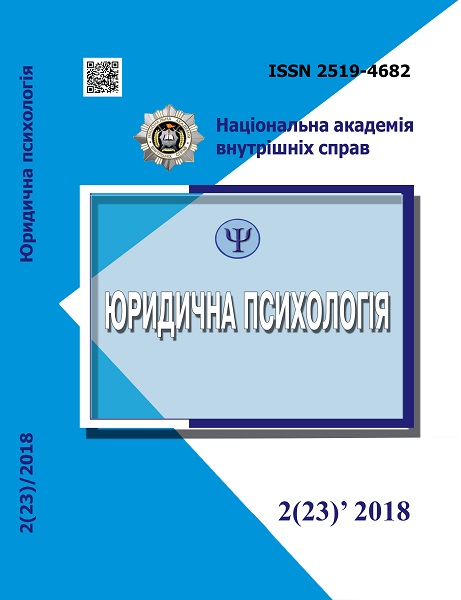Psychological Support in Forming Communicative Tolerance of the Ukraine National Police Officers
Abstract
Tolerance is a complex phenomenon and has no univocal definition and is understood by scientists and practitioners in different ways: as an active form of relation to the world, as an adaptation to the surrounding reality, as a moral or professionally important quality, value orientation, tolerance, emotional stability, as well as specific technology of social dialogical interaction of individuals to find mutually acceptable solutions and forms of behavior, etc. Reforming law enforcement agencies, namely the creation of a new police as a state service, requires the police to have high moral, business and professional qualities, strict discipline, teamwork skills, effective communication with management, colleagues and different categories of citizens. One of the most important professional qualities of a policeman is general and communicative tolerance, which is the basis of justice and legality in the activity of the law-enforcement system. Their formation requires special training and retraining of the staff of the National Police. The purpose of the article is to research the individual psychological characteristics during the formation of communicative tolerance among the employees of the National Police of Ukraine as one of the main characteristics of the success in the professional activity. The research was carried out among the staff of the National Police of Ukraine, which are undergoing advanced training courses at the Institute of Postgraduate Education, including diagnosis and analysis of personality characteristics of tolerance, conducting training sessions, and determining the conditions for improving the efficiency of this process. Taking into account the results of diagnosing the level of development of general and communicative tolerance of the employees of the NPU at the beginning of the study of the special discipline "Tolerance and non-discrimination in the work of the police" provides the opportunity for trainers to significantly increase the effectiveness of training sessions. Further the promising scientific research is the development of comprehensive monitoring programs and trainings for the formation of general and communicative tolerance of the police.
Downloads
Abstract views: 205 PDF Downloads: 396
- Authors reserve the right to authorship of their own work and transfer to the magazine the right of the first publication of this work under the terms of the Creative Commons Attribution License, which allows other persons to freely distribute published work with mandatory reference to authors of the original work and the first publication of an article in this magazine.
- Authors have the right to enter into separate additional agreements on non-exclusive dissemination of the work in the form in which it was published in the journal (for example, to post an article in the institution's repository or to publish as part of a monograph), provided that the link to the first publication of the work in this journal is maintained.
- The journal's policy allows and encourages the posting of articles by authors on the Internet (for example, in electronic storehouses of institutions or on personal websites), both before the submission of this manuscript to the editorial office and during its editorial processing, as this contributes to the creation of a productive scientific discussion and positively affects the efficiency and dynamics of citing the published work.




